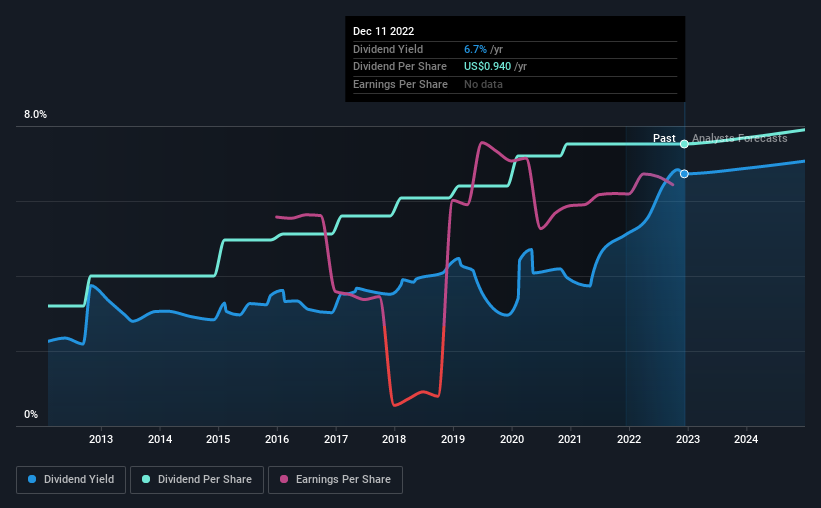- United States
- /
- Diversified Financial
- /
- NYSE:WU
Western Union (NYSE:WU) Is Paying Out A Dividend Of $0.235

The board of The Western Union Company (NYSE:WU) has announced that it will pay a dividend of $0.235 per share on the 30th of December. Based on this payment, the dividend yield on the company's stock will be 6.7%, which is an attractive boost to shareholder returns.
View our latest analysis for Western Union
Western Union's Payment Has Solid Earnings Coverage
Impressive dividend yields are good, but this doesn't matter much if the payments can't be sustained. Based on the last payment, Western Union was quite comfortably earning enough to cover the dividend. This indicates that a lot of the earnings are being reinvested into the business, with the aim of fueling growth.
Over the next year, EPS is forecast to fall by 21.2%. If the dividend continues along recent trends, we estimate the payout ratio could be 59%, which we consider to be quite comfortable, with most of the company's earnings left over to grow the business in the future.

Western Union Has A Solid Track Record
Even over a long history of paying dividends, the company's distributions have been remarkably stable. The annual payment during the last 10 years was $0.40 in 2012, and the most recent fiscal year payment was $0.94. This works out to be a compound annual growth rate (CAGR) of approximately 8.9% a year over that time. Dividends have grown at a reasonable rate over this period, and without any major cuts in the payment over time, we think this is an attractive combination as it provides a nice boost to shareholder returns.
The Dividend Looks Likely To Grow
The company's investors will be pleased to have been receiving dividend income for some time. Western Union has impressed us by growing EPS at 37% per year over the past five years. The company's earnings per share has grown rapidly in recent years, and it has a good balance between reinvesting and paying dividends to shareholders, so we think that Western Union could prove to be a strong dividend payer.
We Really Like Western Union's Dividend
Overall, we like to see the dividend staying consistent, and we think Western Union might even raise payments in the future. The company is generating plenty of cash, and the earnings also quite easily cover the distributions. However, it is worth noting that the earnings are expected to fall over the next year, which may not change the long term outlook, but could affect the dividend payment in the next 12 months. All in all, this checks a lot of the boxes we look for when choosing an income stock.
It's important to note that companies having a consistent dividend policy will generate greater investor confidence than those having an erratic one. Still, investors need to consider a host of other factors, apart from dividend payments, when analysing a company. Just as an example, we've come across 2 warning signs for Western Union you should be aware of, and 1 of them makes us a bit uncomfortable. Is Western Union not quite the opportunity you were looking for? Why not check out our selection of top dividend stocks.
If you're looking to trade Western Union, open an account with the lowest-cost platform trusted by professionals, Interactive Brokers.
With clients in over 200 countries and territories, and access to 160 markets, IBKR lets you trade stocks, options, futures, forex, bonds and funds from a single integrated account.
Enjoy no hidden fees, no account minimums, and FX conversion rates as low as 0.03%, far better than what most brokers offer.
Sponsored ContentValuation is complex, but we're here to simplify it.
Discover if Western Union might be undervalued or overvalued with our detailed analysis, featuring fair value estimates, potential risks, dividends, insider trades, and its financial condition.
Access Free AnalysisHave feedback on this article? Concerned about the content? Get in touch with us directly. Alternatively, email editorial-team (at) simplywallst.com.
This article by Simply Wall St is general in nature. We provide commentary based on historical data and analyst forecasts only using an unbiased methodology and our articles are not intended to be financial advice. It does not constitute a recommendation to buy or sell any stock, and does not take account of your objectives, or your financial situation. We aim to bring you long-term focused analysis driven by fundamental data. Note that our analysis may not factor in the latest price-sensitive company announcements or qualitative material. Simply Wall St has no position in any stocks mentioned.
About NYSE:WU
Undervalued established dividend payer.
Similar Companies
Market Insights
Community Narratives



